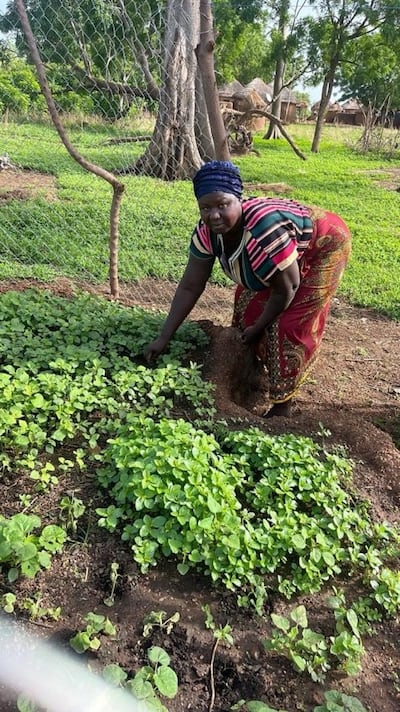Ritu Devi Mandal, a mother of four in Saptari, Nepal, wanted to grow different kinds of vegetables for her family. But water scarcity severely limited her productivity.
This changed when Mandal began participating Fill the Nutrition Gap, an agricultural and nutrition project being implemented by the global nonprofit organization CARE and local partners in several countries through funding from The Church of Jesus Christ of Latter-day Saints.
Mandal joined a Village Savings and Loans Associations group — led by CARE — with other women from her community. The group received training on best farming practices and how to save and borrow from the group to support their own small businesses.
With the new agricultural techniques she learned, a voucher to buy various seeds and tools, and guidance from project staff, Mandal successfully cultivated vegetables — such as bitter gourd, snake gourd and chilies — on one Katha (approximately 338 square meters) of land.
The training also taught Mandal how to produce organic fertilizer and liquid organic manure at home, and she shared the knowledge with her neighbors.
“My son used to fall ill frequently from consuming market vegetables treated with chemical fertilizers,” Mandal said. “Thanks (to my involvement in the project), I started my own nutrition garden using liquid organic manure. Now, my son is healthy from eating home-grown vegetables. I am grateful that I was able to enhance my agricultural skills.”
Mandal now earns money to supplement her family’s income by selling her surplus vegetables at a local market. She is now able to provide better nutrition for her family, a better education for her children and practice saving through the Village Savings and Loan Associations.
The Fill the Nutrition Gap project is also blessing Christiana’s life in Ghana.
The mother of three — whose last name was not given — said that before she started a keyhole garden, feeding her family was a daily struggle, especially from October to May, when the area faces long droughts.
“During these months, fresh vegetables are a rare luxury,” she said. Their meals were often very simple and lack variety, relying heavily on dry okro and Tuo-Zafi (a traditional Ghanian dish).

When she joined the nutrition project earlier this year, she received training on keyhole garden construction.
“The training was a revelation,” Christiana said. As she set up her own keyhole garden, she learned how to use greywater — which is relatively clean waste water from kitchens and sinks — in her garden to help with the water-scarcity issue.
Through the project, the community health nurse provided helpful nutrition education, teaching about the importance of eating diverse vegetables and how to prepare them.
“I still remember her saying, ‘Good nutrition starts with what you grow and cook,’” Christiana said. “This advice was very motivating and helped me focus on improving our diet.”
Cooking demonstrations were also helpful. Christiana learned how to make nutritious meals using the vegetables from her garden and her family’s diet has significantly improved. Her children have a steady supply of vegetables that survive the droughts, and their meals are more varied. They also save money they would otherwise spend on buying vegetables.
“I now cook with confidence,” Christiana said. “The new recipes and techniques have made it easier to prepare healthy meals for my family.”
The project matches the goals of the Church’s global initiative for women and children, led by the Relief Society. This initiative seeks the greatest possible impact by putting money into efforts to particularly bless the lives of women and children under 5 years of age — through the areas of maternal and newborn care, child nutrition efforts, immunizations and education worldwide.
